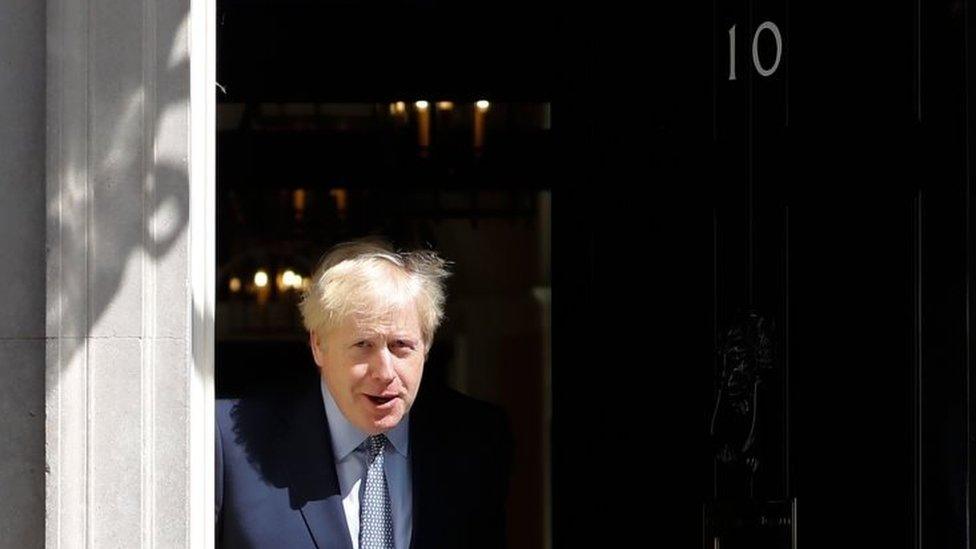Brexit: EU studies backstop while watching MPs in uproar
- Published
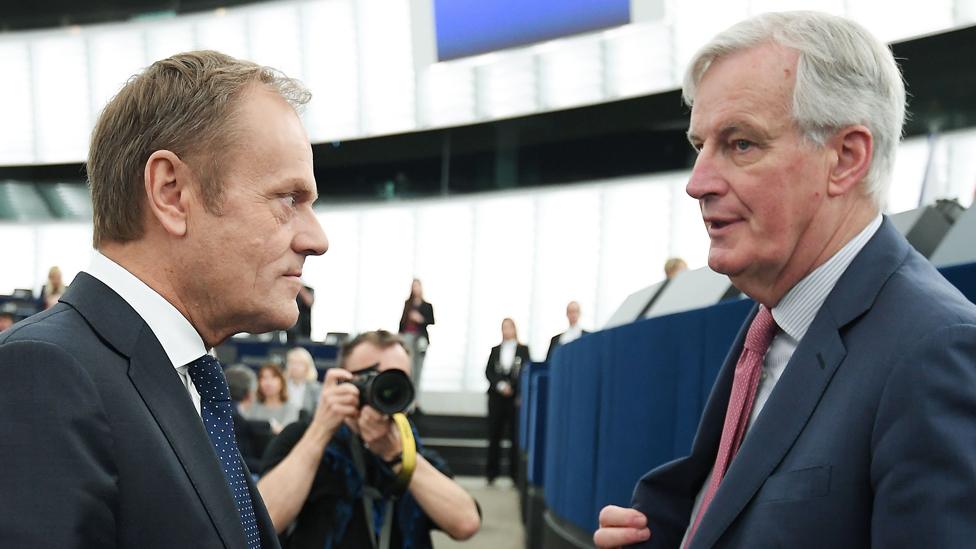
Key players: EU summit chairman Donald Tusk (L) and Brexit negotiator Michel Barnier
As the UK steels itself for a week of edge-of-yer-seat high political drama, what do our "negotiating partners" in the EU make of it all?
I use inverted commas for "negotiating partners" because, despite UK government assertions, there are no real EU-UK negotiations currently taking place.
Truth be told, EU leaders are pretty open-mouthed at what's going on across the Channel.
Italian colleagues mutter that these levels of deep political splits and spin, plus divisions and rampant uncertainty amongst the general public, are normally associated with their country - which, they are delighted to point out, is currently calmly (for once) digging itself out of a government crisis as I write.
A cabinet minister in Finland, meanwhile, described himself as so gobsmacked by the idea that Prime Minister Boris Johnson will suspend parliament at such a time of political crisis, that he likened it to the Finnish government trying to announce a national ban on saunas (which they aren't intending to do, by the way). Finland currently holds the rotating EU presidency.
Brexit could be 'major disaster'
But more senior EU leaders - such as those in France and Germany - have kept their thoughts on the UK political drama to themselves. Make no mistake though: they are monitoring the situation very carefully.
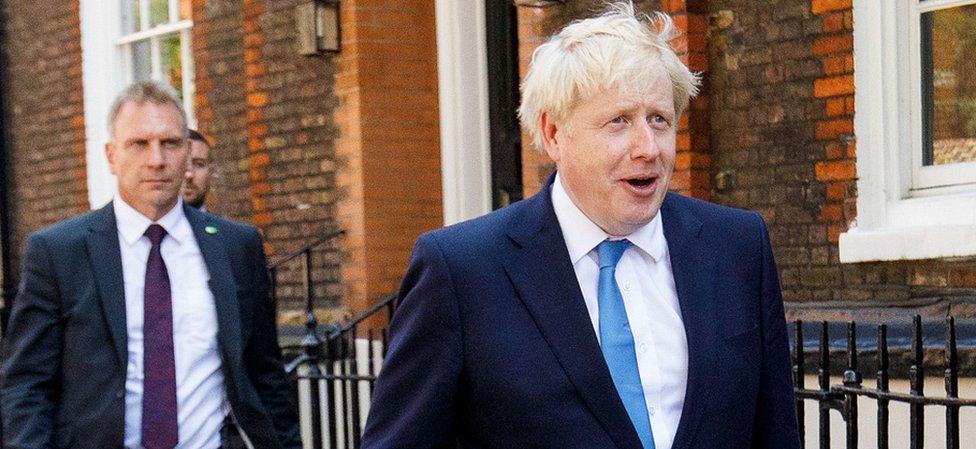
EU leaders are closely watching Boris Johnson's battle in Westminster
You see, for the EU this not at all about Boris Johnson v Jeremy Corbyn or the "Rebel Alliance" v Brexiteers in government. It's about damage limitation.
Consider the fact that EU officials in Brussels have just announced they're debating whether to classify a no-deal Brexit as a "major disaster", external, so that affected EU countries can legally request compensation funding from the bloc's Solidarity Fund, usually reserved for floods, fires and earthquakes.
There's a very stark contrast between the EU focus at the beginning of these negotiations - when Brussels wanted the UK to sign up to the most advantageous deal possible (from the EU perspective!) - and now, with a no-deal Brexit looming, when the EU is in full self-preservation mode.
Not a deal at any price
Political leaders like Germany's Angela Merkel and the Netherlands' Mark Rutte are nervously wondering how they - and the bloc as a whole - can emerge from the Brexit drama as unscathed as possible.
Aware of the economic cost of no deal for them at home, plus the geopolitical impact of an acrimonious no-deal Brexit - which they believe would serve the interests of Donald Trump and Russia's Vladimir Putin above anyone else's - they are very keen indeed that a Brexit compromise deal be found, if possible.
But as ever, EU leaders' keenness to agree a Brexit deal should not be confused with a willingness to do whatever it takes.
EU Single Market concerns are paramount when looking at alternatives to the backstop guarantee for the open Irish border.
Confused by Brexit jargon? Reality Check unpacks the basics.
Angela Merkel is certainly not chasing a deal "at any price".
The EU will only make real compromises if Europe's leaders are convinced that their pain will definitely result in their gain.
That by the EU making change X or Y to the Brexit deal, then a majority in the UK parliament would be guaranteed to pass the revised deal.
Right now Brussels can see that Boris Johnson doesn't have the numbers.
An election could change all that, of course. If it were held before the UK leaves the EU. If Boris Johnson were to win a majority.
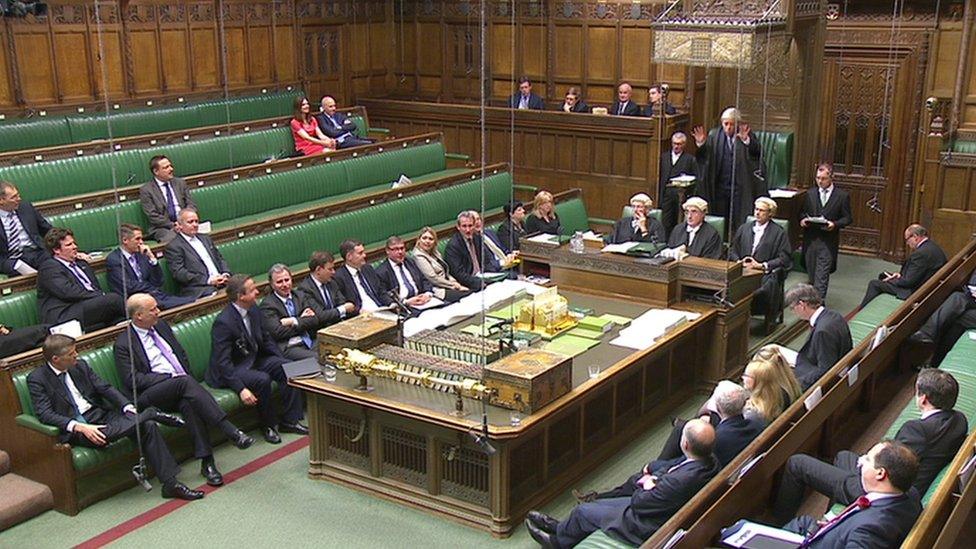
Brexit drama: This is a crunch week for MPs as time is running out
The prime minister is wrong to claim the UK's negotiating power is dependent on a credible no deal threat and is weakened purely by rebel MPs' push to prevent a no-deal Brexit by 31 October.
EU leaders believe Mr Johnson is serious about no deal, but that alone is not enough to persuade them to make serious changes to the Brexit Withdrawal Agreement.
It cannot be emphasised enough: Boris Johnson's parliamentary numbers are key.
The PM said on Monday night that he doesn't want to hold an election (though rumours persist that he'll call one anyway).
He also said he believes the chances of a deal with the EU are rising all the time.
EU watches and waits
Things look and sound very different in Brussels.
"We can see Boris Johnson is playing a political game," a diplomat from a country traditionally very close to the UK told me. "But we don't understand the rules or the strategy."
Yes, the prime minister's EU envoy David Frost travels back and forth to Brussels. He is expected here on Wednesday and possibly again on Friday this week.
But the Johnson government has yet to put a workable alternative to the backstop on the table and the EU is waiting to see what happens in Westminster. Meanwhile, Mr Frost's visits are regarded in the EU as optics aimed at a UK domestic audience, rather than a serious opportunity to talk substance.
The process is viewed across Europe with deep distrust.
More Northern Ireland options
Officially, of course, the EU position is that it waits for London to come up with alternative solutions to replace the controversial backstop to keep the Irish border open after Brexit.
But what would an acceptable alternative look like? Does it actually exist? EU figures are divided on this.
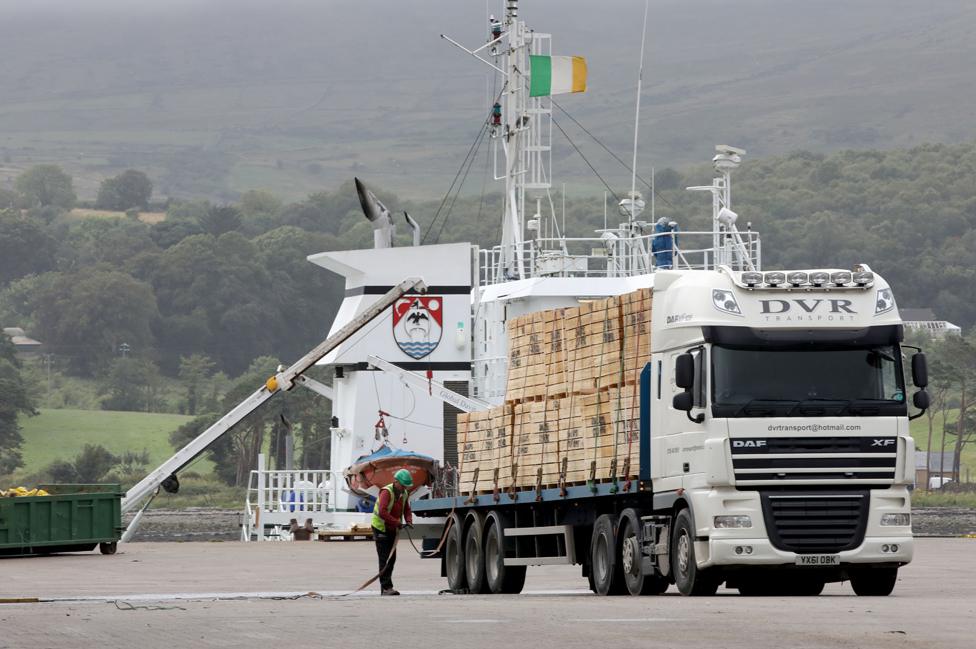
Warrenpoint Port: The Northern Ireland border remains the thorniest issue
Some in Brussels hope a win for Boris Johnson in Westminster would allow him to return to the original Northern Ireland-only backstop, as he would no longer be reliant for support in parliament on the Northern Ireland unionist DUP party.
That original backstop proposal would see only Northern Ireland remaining in a customs union with the EU and adhering to some single market rules - not the whole UK.
EU diplomats say they could dress up the "new old backstop" as something different, to make it easier for Mr Johnson to sell back home.
And there are those in Brussels who even wonder if the prime minister could hold a referendum in Northern Ireland on whether to accept that backstop, safe in the knowledge that polls suggest the majority there are in favour. Though of course such a referendum could easily be manipulated into a de facto vote on Northern Ireland's political future instead.
Swiss model reheated?
Another thought doing the Brussels rounds is that the EU may have to hold its nose and go for a sector-by-sector customs agreement for Northern Ireland, similar to the deal the bloc has (and had sworn never to replicate) with Switzerland.
But of course Switzerland has customs infrastructure on its EU borders, something that no-one wants to see in Ireland. Would Dublin accept some checks between Ireland and the rest of the EU to avoid a no-deal Brexit?
The EU-UK route towards compromise is as fraught with difficulty as the current UK political impasse.
There's only one bet that EU figures are happy to make at the moment: that the EU leaders' scheduled mid-October summit will not deliver their final word on deal or no deal.
Expect a Brexit-focused emergency EU summit (or two) before Halloween night is out.
- Published2 September 2019
